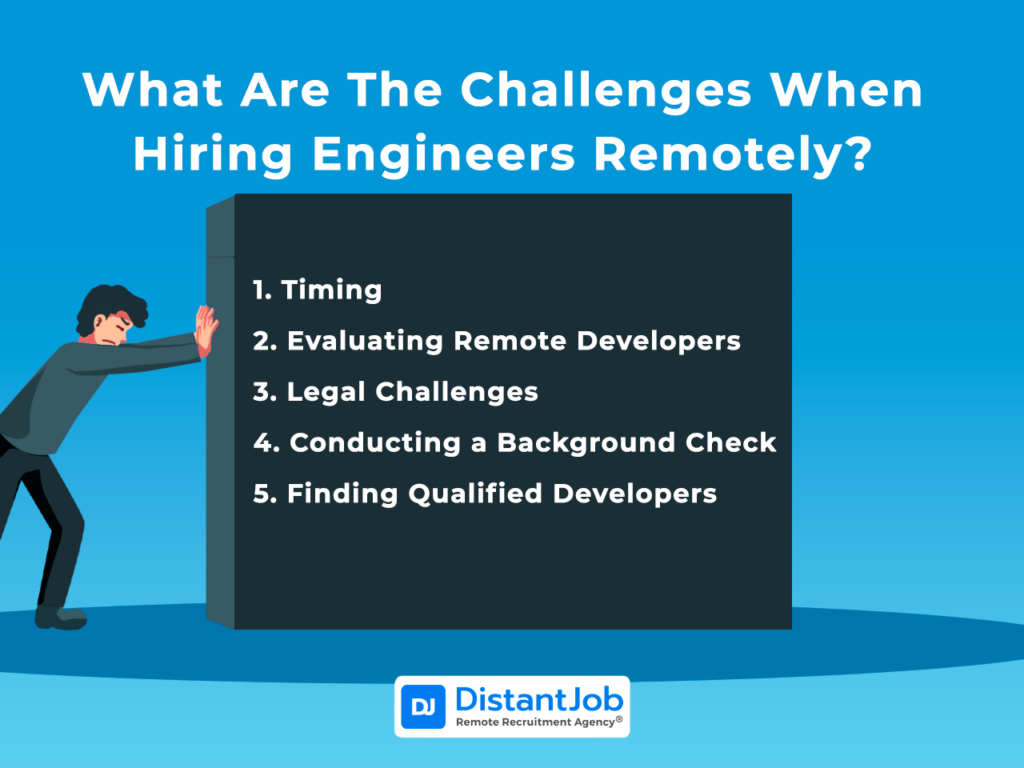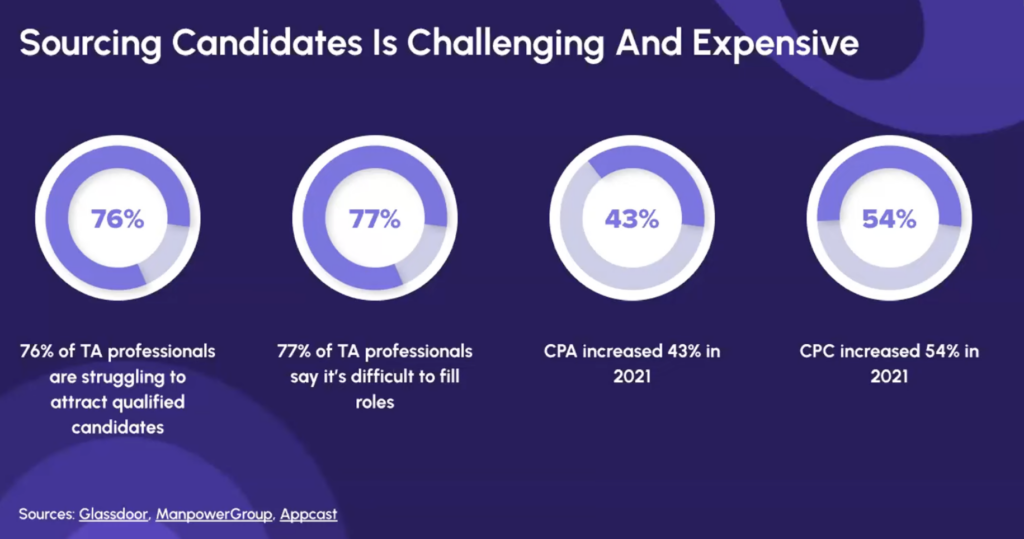With the rise of remote work, the talent pool for software developers has expanded beyond local boundaries, offering greater opportunities but also adding complexity to the hiring process. Finding and hiring remote developers from different regions and time zones requires a strategic approach. You need to consider factors such as time zones, specialized skills, sourcing locations, and payment methods.
No worries—we’ve got all that covered in this blog, from tips to successfully hire remote developers to the challenges of the recruiting process and how to tackle them.
Understanding the skills and qualities you seek when hiring remote developers is just the first step. The challenge lies in finding, sourcing, and vetting top-tier developers worldwide. Here’s how to do it right!
How to Hire Remote Developers
- Craft Attractive Job Descriptions
- Find Remote Developers on Online platforms
- Vet Candidates
- Evaluate Their Work Portfolio
- Conduct In-Depth Interviews
- Assess Remote Working Skills
- Make The Final Offer
- Onboard And Support Your New Remote Developers
1. Craft Job Descriptions That Attracts Candidates
The remote hiring process is not just about evaluating candidates; it’s also about presenting your company in a positive light to attract top talent. A smooth, respectful, and engaging hiring process is crucial.
In the remote work era, candidate experience is vital as it influences your company’s reputation in the job market and platforms like Glassdoor.
In the job description, in addition to including an understandable job summary with a clear list of responsibilities, provide an overview of your company that outlines the mission, culture, and any other standout aspects of your organization. Explain what makes it a great place to work, as this will help attract potential job seekers.
2. Find Remote Developers for Hire on Online Platforms
Often, the main question hiring managers have when seeking technical roles is where to find remote developers.
There are several places to find remote developers; these include:
3.1. Partner with recruitment agencies
Remote recruitment agencies are one of the easiest ways to find and hire remote developers. At DistantJob, we have succeeded in finding the right candidates for companies in just two weeks.
Besides the sourcing, evaluation, and vetting, we go a step beyond taking care of all the paperwork (this includes EOR, contracts, NDAs, IP protection, payments, and more).
3.2. Scout Job Boards
Job boards are also great places to find remote developers. You can advertise the role and wait for candidates to apply.
The key here is to make a good job description, as this works like the spoiler of the company. If you engage candidates from the start, chances are you will get more applications and options.
Some popular job boards are Glassdoor, LinkedIn Job Search, Career Builder, and ZipRecruiter.
3.3. Online Communities
Online communities are a great alternative to finding software developers. As these are built and managed by developers, they share experiences, tips, failures, and in most cases, job opportunities and recommendations.
The best online communities to find remote developers are GitHub, Stack Overflow, Hacker News, Reddit, and Hackernoon.
3.4. Professional Networks
LinkedIn is a premier professional networking platform, with close to 900 million users having provided detailed profiles, making it an ideal resource for employers to passively uncover potential candidates.
To begin, you can add the Hiring Badge to your company’s profile and start reaching out to potential candidates with your offer. Additionally, you can view their profile, work history, referrals, and more to get a better idea of their skills.
3.5. Internal Hiring
Internal hiring is the fastest way to get someone for the role. As it involves transferring an existing employee from one area to another, they already know how the company works, its culture, mission, vision, dynamics, and more. So it´s just a matter of evaluating them and seeing if they are the right fit for that specific role.
3.6. Collect Referrals
Referrals are often one of the top three sources used by employers to find qualified candidates. Having an employee refer your organization to potential hires is a great way to connect with qualified personnel. While hiring through job boards can be costlier in the long run, offering a referral bonus is a relatively inexpensive way to source new talent.
3.7 Ask Employees to Share Job Openings on Social Media
Encouraging your employees to share job openings on their social media to reach a larger, more targeted pool of potential candidates. Your employees’ social networks offer an excellent way to connect with talented professionals who may not be reachable through traditional recruiting channels.
By sharing job openings through social media, your employees can help create a more positive image of your company in the eyes of potential new hires and the public at large.
3.8 Connect with recently laid-off professionals
Connecting with recently laid-off professionals can be a great way to find remote developers. Monitor lay off news , or open-to-work candidates on Linkedin. It provides access to a pool of talent that, due to unforeseen circumstances, are now actively looking for a new job. This can provide fast access to highly qualified developers.
4. Vet Candidates
The next step after you´ve sourced a pool of candidates is screening. Here you want to start filtering what candidates are suitable for the interview and evaluation and which ones are not. This may involve reviewing resumes, conducting initial interviews, and in some cases (depending on the role), conducting technical assessments.
Many companies use an ATS (applicant tracking system) to speed up this step. An ATS is a software application that manages the initial steps of the recruitment process.
Once candidates submit their job applications, the ATS filters them, extracting important information, and stores them in a database accessible to recruiters and hiring managers. Then, the ATS ranks candidates’ applications based on keywords and skills mentioned in the job description and screens them to ensure that candidates meet at least the minimum qualifications.
You overview this selection and choose with whom you want to move forward in the application process.
5. Evaluate Their Work Portfolio
A work portfolio from the candidates helps you evaluate their skills and experience. This is particularly important in technical roles, where evaluating these skills can often be challenging.
At DistantJob, all of our recruiters have technical backgrounds, so we decide the type of evaluation based on the role, and we suggest you do the same.
If you need a software enginner for a specific project, evaluating them based on the project will help you get a hint about their skills. Also, check their portfolio and credentials to see how they’ve applied their skills in previous projects.
6. Conduct In-Depth Interviews Like a Pro
After you’ve evaluated their work samples, conduct in-depth interviews to know the candidates better.
These interviews involve not only gaining a deeper understanding of candidates’ strong skills and qualifications but also learning more about their experience working for similar roles, their strengths, and their weaknesses. They also involve getting to know them more personally, learning what motivates them as remote developers and why they like their profession.
When preparing the questions and evaluations, be creative. Candidates sometimes memorize questions and answers, and the idea of these interviews is to get to know candidates authentically, not with prefabricated answers.
If you want to hire a web developer, per se, don’t ask them the basics about web development; go a step beyond, asking them questions that require them to apply their knowledge and experience.
When conducting these interviews, it is also valuable to ask other team members to be part of the interviewing process. Group interviews give other perspectives or things you are not seeing, and it’s also an opportunity to check how a candidate interacts with their potential colleagues.
7. How Should You Assess Remote Working Skills?
Since you’re hiring for a remote role, it’s important to assess the candidates’ ability to work independently and effectively communicate with team members.
Not everyone is suitable for remote work, so it is important to ensure candidates enjoy this type of dynamic, where work happens mostly asynchronously and they do not need to rely so much on other team members.
Skills such as communication, time management, collaboration, self-motivation, and adaptability are key.
8. Ready to Make The Final Offer?
After going through all evaluations and assessments, it’s time to decide.
Choose the best candidate for the role, and remember that not only does their technical expertise matter but also their personality and how they interact with others.
Keep in mind that offering a high salary is not enough for competitive roles such as software development. When making the final offer, highlight all the benefits they will enjoy associated with this role, such as flexible schedules, remote work, PTO, and more!
9. Onboard And Support Your New Remote Developers
Congrats! You already went through the hardest and longest part of the hiring process. Now, it’s time for the cherry on top: providing a comprehensive onboarding process and ongoing support.
This last step helps new developers learn more about the company and its culture. It’s also a great way to build a closer relationship with them, so they feel more engaged, comfortable, and valuable in the company.
Start by providing clear expectations of the role, their first goals to achieve, how processes work, and overall, what’s the company’s overall vision. In this step, it’s also valuable to offer virtual training and resources for them to understand more about the company’s processes and tools. You can consider assigning a mentor who can provide guidance and support to make it smoother for developers to adapt.
Finally, during the onboarding process, supporting work-life balance and encouraging employees to take breaks and set boundaries will also help them experience the benefits of working for a company that values employees’ well-being.
Identifying the Right Remote Developer Skills

To recruit remote developers, prioritize candidates with a blend of technical expertise and soft skills. Top talent demonstrates proficiency in both areas, which is essential for optimal performance in remote work. Let’s start with the technical skills to look for.
Technical Skills for Remote Developers
Hard skills are the first ones to check. Today, due to the remote work landscape, the skills required for successful software development in a remote environment are getting much more complex. The most important tech skills include:
- Versatility in Programming Paradigms: Seek candidates who have proficiency in at least one programming language from various paradigms, showcasing their versatility and adaptability. For instance, knowledge of C++ for high-performance general-purpose programming, Java for medium-performance applications, C for embedded systems, Python for scripting tasks, and Bash for shell scripts and build systems.
- Data Modeling: Developers should demonstrate their ability to conceptualize data structures and their relationships within the application. They should be able to explain how data interconnects within the broader context of their code.
- Effective Code Documentation: In a remote setting, clear and meaningful documentation of code is essential for asynchronous collaboration. Look for developers who understand the importance of clear and purposeful code comments. They should be able to explain their code’s intentions, its expected outcomes, and why certain decisions were made, beyond just stating the obvious.
- Understanding of Remote Work Tools: Proficiency with tools that facilitate remote work, such as version control systems, project management software, and communication platforms.
- Tech Enthusiasm: Candidates need to show genuine enthusiasm for technology. This could be through discussing personal projects or interests in tech-related hobbies like custom PC builds, or home automation. Their passion for any tech topic can be a great indicator of their commitment and ongoing engagement in the field.
Soft Skills for Remote Developers
While technical skills are fundamental, soft skills such as effective communication, emotional intelligence, adaptability, and collaboration are equally important for remote developers in bridging the challenges brought by remote work.
Non-technical skills play a pivotal role in shaping a developer into a top performer. The US National Bureau of Economic Research has highlighted that certain soft skills, such as conscientiousness, are often more predictive of a person’s success than their cognitive abilities alone.
The soft skills to look for in a remote software developer include:
- Self-Directed Learning: Candidates should be capable of quickly learning enough about unfamiliar fields to effectively write software. This skill demonstrates their ability to adapt and grow in various domains: as remote work often requires self-motivation and self-teaching.
- Communication Skills: Being able to explain any aspect of their software to a diverse audience, from technical colleagues to non-technical stakeholders, is essential. Remote work involves understanding and learning from people across different cultures and communication styles, often in written form.
- Detachment for Objective Self-Evaluation: Especially in a remote setting, developers need to evaluate their work objectively without immediate feedback from peers.
- Tenacity in Troubleshooting: Search for candidates who can share specific instances where they faced persistent challenges, such as bugs or undocumented software behaviors. They must demonstrate deep knowledge of the issue and how they relentlessly worked through it to find a solution.
- Receptive of Receiving Feedback: The ability to sift through less relevant information and accept constructive criticism is key. This shows maturity and the capacity for professional growth.
- Humility in Coding: It’s crucial for coders, regardless of their experience level, to acknowledge when they don’t know something or when they might have made an error in their code. We value developers who are open to the possibility of mistakes and are proactive in addressing them.
- Balancing Work and Personal Life: Lastly, look for candidates who can balance their professional programming responsibilities with their personal lives. This balance is crucial for long-term productivity and job satisfaction.
What to Avoid When Hiring a Remote Developer
There are a few things that can negatively impact your hiring. Here’s how to overcome those challenges:

1. Timing
Recruiting talented and trustworthy remote developers is challenging for many businesses, regardless of location. With a vast pool of qualified candidates, it can take time to find the right fit. This is why sometimes timing in the hiring process becomes a crucial factor.
When recruiters or the HR team can identify the right candidates at the right time, the process is smooth and fast. But when they are inexperienced and have no idea where and how to look for the right candidates, the process becomes slow and inefficient.
2. Knowing How to Evaluate Remote Developers
Your hiring manager should be well-prepared to know how to evaluate developers´ both technical and personality aspects.
A practical solution is having candidates complete a test project. Here you can have a more hands-on evaluation of their skills and overall better understand their work style, rather than just relying on an interview.
Remember that the evaluation you conduct should adapt to the type of developer you´re seeking.
3. Legal Challenges
Legal considerations add another layer of complexity when hiring remote developers. Protecting intellectual property, navigating tax laws, securing insurance, drafting employment contracts, and understanding different legal systems are just a few of the legal challenges that must be addressed.
Before hiring a remote developer, it’s important to ensure that your company can legally do so and that the arrangement complies with the laws of the region where the contractor is located.
While hiring a developer from a country with lower labor costs may be tempting, verifying that their compensation complies with local standards and that they are not being taken advantage of is essential.
Hence, working with recruitment agencies like DistantJob becomes valuable as they focus on taking care of all the payroll and legal aspects.
4. Knowing How to Conduct a Background Check
The challenges of remote interviews can often lead to difficulties in verifying a candidate’s qualifications and experience. It can be challenging to accurately assess a remote developer’s abilities through a video call or phone conversation compared to an in-person interview.
When evaluating potential remote software engineers, you should build a detailed process to ensure all their educational credentials, skills, and experiences are real.
Here’s how you can do background checks on remote developers during the evaluation process:
- Check references: Ask the candidate for professional and personal references and contact them to ask about the candidate’s work history, performance, and dependability.
- Verify credentials: Contact the schools or companies listed on the candidate’s resume to ensure the candidate’s education and work experience are valid.
- Verify work samples: Ask the candidate for work samples and check them for quality and authenticity.
- Check online presence: Look for information about the candidate on social media, professional networks, and other online sources to see if any information may raise red flags.
5. Sourcing Candidates on Your Own is Challenging and Expensive

Sourcing remote candidates can be a challenging and costly process due to the difficulty of recruiting for roles outside of the standard location of work.
A major challenge is the sheer size of the remote developer market, which is estimated to be between 5.5 million and 6 million professionals, according to Glassdoor Economic Research.
The two major factors that lead to higher costs of recruiting remote workers include:
- Increased cost for advertising job postings – Advertising job postings tend to cost upwards of 39% more than it does for on-site positions.
- Recruiting from a remote pool requires a higher level of decision-making skills and experience.
- Longer recruiting process for remote software developers—The process of recruiting, interviewing, and onboarding a remote employee takes 2.5-3X longer than recruiting on-site employees.
The added costs of recruiting a remote dev team need to be weighed against the potential benefits of managing remote workers. Many companies are finding that the cost of remote workers is well worth it when one considers the long-term benefits of having a well-trained, remote team that can handle more complex tasks in a shorter period.
Many companies recognize the complexities that come with this process, so they choose to outsource it or hire the services of an IT headhunting agency for assistance. One of the benefits of IT recruitment agencies is that they can take charge of the process and offer you the best candidate that fits your needs… in record time!
Why Full-Time Developers and not Freelancers are Key to Startup and SMB Success
When starting a new business or a small-medium enterprise, you want a team that’s as invested and passionate about your vision as you are. Choosing between hiring full-time developers or freelancers can significantly affect the development and success of your business. Here’s why opting for full-time developers could be the winning strategy for your startup or SMB:
As a general rule, these are the considerations you need to keep in mind when evaluating what type of developer fits best:
| Differences | Freelancer | Full-time Developer |
| Contract Type | A freelancer typically works on a project-by-project basis, with a set agreement for the scope and timeline of each project. | A full-time remote developer is a permanent employee who works for one company. |
| Availability | Freelancers often take on multiple projects at the same time, so it makes it harder for them to be available. | A full-time remote developer is always available and committed to working for one company. |
| Skills and expertise | Freelancers may have a wider range of skills and expertise as they work with multiple clients. | A full-time remote developer will typically have a more specialized skill set. |
Takeaway: A freelance developer is a good idea when you need help with a specific project within a limited time frame. But if you need someone who is fully committed and willing to evolve in the role, a full-time developer is the best solution.
Is The Process of Hiring Remotely Expensive?
Hiring developers can be expensive, and the cost can vary depending on several factors, such as the company’s location, the developer’s experience level, and the demand for developers in the particular field.
Here are some of the usual costs associated with hiring remote developers:
- Recruitment costs: Recruitment costs can include advertising the job, attending job fairs or events, and paying for services such as recruitment agencies or job boards.
- Salaries and other benefits: Developers’ salary and benefits package can vary depending on their experience and skills and the company’s location. In some locations, such as major tech hubs, salaries can be higher due to high demand.
- Onboarding and training: There may be costs associated with onboarding and training, including providing equipment, software, and access to tools and resources.
While hiring remote developers through third-party organizations can add up an extra cost, depending on the organization itself and their experience, these, in the long term, can be more efficient as they will seek out remote developers in locations where the cost of living is lower.
For instance, hiring a senior remote developer in the U.S. is around $100,000 per year (if not more), while hiring skilled Eastern European developers costs between $60,000 to $90,000 per year.
Conclusion
Finding the right remote developer can be done if you follow these simple steps. But if you find it overwhelming to do it on your own, don’t worry. Leave it to us. We will take on the challenge and commit to finding you the developer you need in just 2 weeks.
Our specialized recruitment agency offers access to top talent, a customized recruitment process, and ongoing support to ensure a successful hire. By partnering with us, you can save time and money while you can focus on other aspects of your business, while we do the heavy lifting such as recruiting, vetting and interviewing.
We provide a customized recruitment process based on your needs and preferences and can get you the perfect match in less than 2 weeks. Interested? Contact us today online or visit our offices in Montreal.




